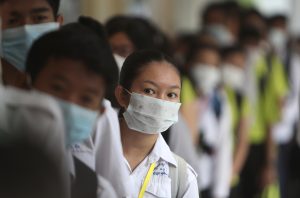The world economy has taken a massive hit as countries take measures to prevent the spread of the novel coronavirus disease, or COVID-19. From Asia to Europe to the United States, private business are closing down as citizens shelter in their homes to prevent community transmission of the highly contagious, poorly understood disease. Asian states had been at the forefront of reacting to COVID-19, given the disease’s origins in China, but the economic consequences are global. To better understand the new economic environment and what other countries might learn from Asian countries that have successfully mitigated and contained economic damage, The Diplomat’s Ankit Panda spoke to Nicholas Wyman, CEO of IWSI America.
The Diplomat: What steps can countries take to mitigate the economic damage?
Nicholas Wyman: The most important step governments can take is to be transparent, honest, and clear in their communications so they can retain the trust and confidence of their population.
Governments can be expected to open their wallets and spend whatever it takes to remove systemic and social uncertainty, and to give people the confidence to think beyond the short term. I would expect multiple rounds of government stimulus, potentially trillions of dollars worldwide, with many new and novel ideas tested. Expect to see more coordinated central bank actions and quantitative easing to prop up markets also.
What can Western countries now dealing with the worst of the pandemic learn from how Asian countries reacted?
All countries will be required to adopt a mix of travel restrictions, quarantine, and reduction in social activity and human contact in the short-term. The mitigation and containment efforts adopted by governments across Asia thus far have provided valuable preventative insights and a playbook to countries to follow on how to slow and control a COVID-19 outbreak once it arrives in their populations.
The Singapore government acted fast in limiting travel with China, identifying and testing potentially exposed people, quarantining and isolating infected people if required, and mapping their movements during the incubation period. It also offered to financially support people affected by the virus. Thus far, Singapore has not had to shut down schools or businesses. South Korea’s”trace, test, and treat” response, adopting an early, rapid, and widespread testing regimen and establishing a pop-up network of clinics to prevent people showing up at hospital emergency departments has also been very effective in helping manage the outbreak. South Korea is reporting a significantly lower fatality rate.
Will COVID-19 transform the global workforce in ways that could be advantageous for service-sector workers in the Asia-Pacific?
It’s hard to say at this point in time. In the short term, COVID-19 is going to severely affect the service-sector: everything requiring travel and human movement from accommodation, dining, cultural and sporting events, and a whole of entertainment and recreational industries will be hit and businesses and individuals will reconsider their priorities and narrow their focus until the storm passes.
How long it takes to return to normal, or for a “new normal” to emerge, is anyone’s guess. I would expect some sectors, such as cruise liners, may never recover, and other sectors will see a permanent decrease in aggregate demand and total employment.
This will be offset by expansion in health and human services employment, and we can expect governments worldwide to reorient their thinking about the role and scope of government services.
COVID-19 will also create more opportunities for businesses providing technology and data-driven products and services in areas like supply chain logistics, cloud IT, automation, etc. as business seek to develop operating processes and systems which can withstand any future COVID-19-like shocks.
Several institutions of higher education have gone online-only in response to the pandemic. How, if at all, do you expect this trend to affect Asia?
I think we will see a contraction in students studying internationally in the next three to five years, as uncertainty keeps people closer to their families, and people are more reluctant to move overseas in case they get caught in a quarantine or lockdown.
The significant variability in the quality of online education provision across institutions and even programs has been exposed by COVID-19.
Long term I expect this to expedite the shift of universities moving from face-to-face teaching to online delivery, and investing significantly more funding into boosting their online capabilities and learning management systems in order to in order to ensure continuity of teaching and minimize disruption for students and staff.
Australian universities have been scrambling to accommodate approximately 100,000 Chinese students who have been unable to travel to Australia due to COVID-19 travel restrictions. Whilst these students are currently being serviced though low-tech solutions (file transfers, Zoom or Skype lectures, WeChat forums etc), we can expect educational institutions to completely re-engineer their online education experiences once the crisis passes.
Finally, globally, how will COVID-19 change the workforce more generally?
I think COVID-19 will significantly, and perhaps permanently change our working methods and patterns. In the last week we have seen many companies announce they are expanding telecommuting and remote working situations (many for the first time), relying on IT networks and tools such as Zoom and Slack. By necessity, we will expect our work processes and systems to adapt to this new distributed work model. Our organizational cultures will also need to adapt, and for many that will involve embracing greater workplace flexibility.
Once this crisis has passed, it will be an open question when or if office life goes back to the way things were: how long will it be before people will feel comfortable in returning to the office? Will workers start to ask management to work from home on a more permanent basis to reduce the viral exposure risk from public transport (and spare them the time spent commuting)?
We can also expect to see far less business travel and conferences in the foreseeable future.
This interview has been edited.

































